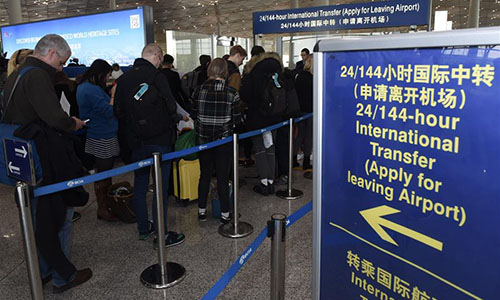HOME >> CHINA
New visa-free policy helps opening-up, allows 144-hour transit
By Li Qingqing Source:Global Times Published: 2019/10/23 22:03:40

Passengers wait for the procedure of 24/144-hour International Transfer at the Terminal 3 at Beijing Capital International Airport in Beijing, capital of China, December 28, 2017. China on Thursday extended its visa-free period for people transitting through Beijing to 144 hours, and added neighboring Hebei Province and Tianjin City to the program. Transit air, train, and ship passengers entering either of the six border ports in Beijing, Tianjin and Hebei can stay in the region for six days before heading for another destination, according to Beijing's Port Office. Photo: Xinhua
The number of Chinese border ports that allow eligible international travelers to transit within 144 hours without a visa will increase to 27 starting December, and the newly added ports are in three provinces and one municipality that are significant to the country's Belt and Road Initiative.
Officials said the move aims to further optimize the country's regional development and opening-up.
The three provinces are East China's Zhejiang Province, Southwest China's Sichuan Province and Northwest China's Shaanxi Province, while the municipality is Southwest China's Chongqing Municipality, Jia Tongbin, deputy director of the foreign affairs administration with the National Immigration Administration (NIA), said at a press conference on Wednesday.
Jia said Ningbo in Zhejiang Province is an important city to promote the development of the Yangtze River Delta metropolitan area and a hub of the BRI's combined transport by rail and sea.
Chongqing and Chengdu in Sichuan are located at the junction of the Yangtze River Economic Belt and the Silk Road Economic Belt, and are strategic pivots of China's western development drive, Jia said.
Jia described Xi'an, Shaanxi Province as the starting point of the ancient Silk Road and is an essential city in the opening-up of China's western area.
The NIA's new policy will provide foreigners with more convenience for short-term activities in China, and will create better conditions for foreigners to feel China's development and openness, said Yin Chengji, NIA vice director.
Huang Rihan, executive dean of the Beijing-based Digital Economy think tank, told the Global Times on Wednesday that optimizing the visa-free transit policy in the four cities is a practice specific to China to implement the BRI.
Since many countries give visa-free policies or visas on arrival to China, the NIA's policy can be considered a response, and can also hasten China's step in building a new structure of comprehensive opening-up, Huang said.
Since 2013, China's State Council has approved 72-hour and 144-hour visa-free transit policies in 18 provinces, 23 cities and municipalities and 30 ports.
RELATED ARTICLES:
Posted in: SOCIETY